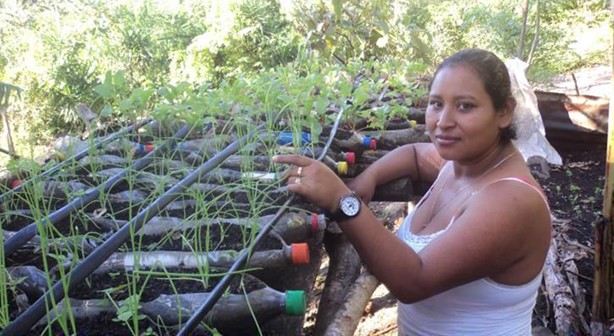
A Small Business Started in Martha’s Garden
My name is Martha Elena. I’ve always enjoyed having plants in my yard, and used to try to grow vegetables but without much success; they would wilt and not produce. I figured my soil wasn’t any good, or I just didn’t have a “green thumb.” I also got very discouraged when the animals would eat all my plants.
Then, a year ago, I participated in a workshop with ACJ about how to grow a vegetable garden. They showed us pictures of how folks like me had done it in other communities where they work. I agreed to give it another try, so the technical staff showed me how to prepare the earth for planting and how to use recycled materials like plastic bottles and other containers to plant in.
We constructed raised beds, out of the way of the animals. I was worried about how I would get enough water for my plants, but the ACJ staff assured me that they wouldn’t need as much in the containers. It was very satisfying for me to find that I could harvest lots of vegetables like onions, cucumber, beets, peppers and tomato after all. What’s more, our family can enjoy eating all our fresh produce knowing we aren’t consuming toxic chemicals, because we know what we put in our soil.
I’ve also learned how to keep my own seeds for planting. That helps me save money because I don’t need to buy seeds or fresh vegetables any more. And I’ve started a small business pickling vegetables from my garden to sell to local restaurants. My kids are learning right along with me, since they help me with our garden. They’ve learned about recycling at school, and they like to find ways to make good use of our plastic garbage.
I’m grateful to God for giving me strength and perseverance, and I hope to continue learning about how to grow healthier, tastier food in my garden.
FRB’s local partner, ACJ, has learned that women are motivated by concern for their children to learn to grow, prepare and eat healthy foods. Using creative planting containers like sacks, bottles, or raised beds makes it easy for them to look after their vegetables close to their homes. Not only do containers conserve more water than traditional open beds – especially important during the dry season – but placing them close to their homes means they don’t have to carry water very far, and can re-use wash water for their plants.
Nicaragua-Boaco encompasses 8 communities, 210 households, and 860 individuals
